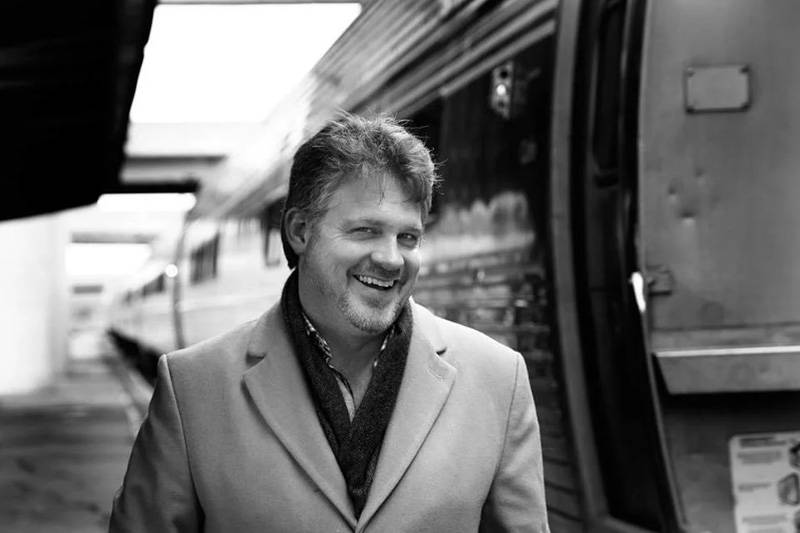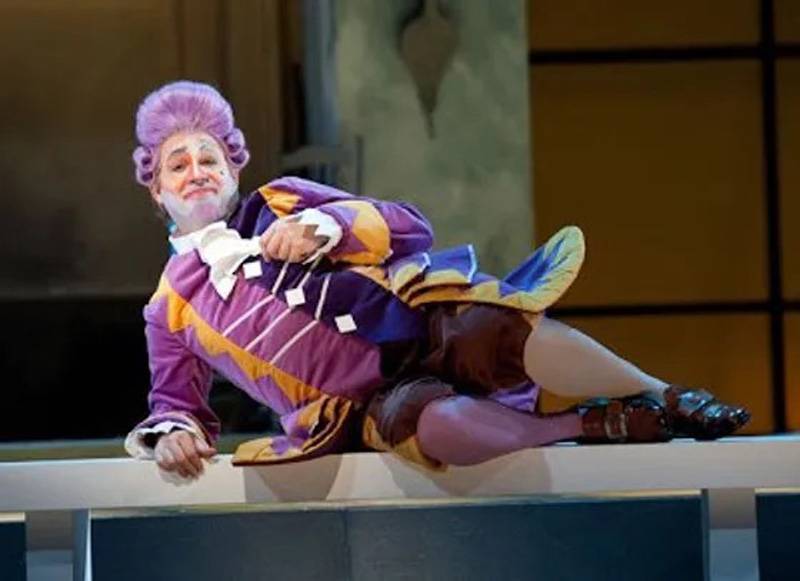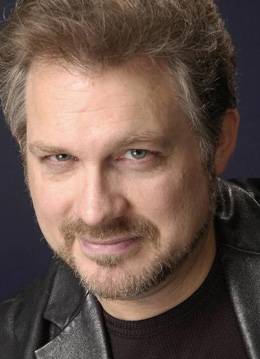
Valerian Ruminski’s talent has been appreciated for decades, and even as a young boy at St. Andrews in Buffalo, if there was any time left toward the end of the day, his biggest fans would make a request.
“The nuns would say, ‘Marty, sing us something.’ Marty was my real name, Valerian was my father’s name so I took that as my stage name, so they’d say, 'Marty, oh, sing us something,' I was always singing at the drop of a hat when I was a kid. I never thought that it was gonna be a career,” the veteran singing basso contante said during an interview with The Batavian. “But as I got a little older, I went to Canisius High School and was in the choir, and then when I was a senior, my teacher took me aside and said, you know, he says, out of the hundreds of students that I have, every couple of years one comes along that I have to tell them that they should pursue a career in music. And you're the one … he was strongly advising me that I had, you know, ample talents in that area.”
And, although Ruminski didn’t exactly follow the path to classical fame he’s now known for decades later (he was waylaid by an Alaskan fishing boat adventure), he has several accolades under his belt, including performances at Carnegie Hall, Orlando Opera, Danish National Opera, Geneva Light Opera, New York Symphonic Ensemble, Lincoln Center, Calgary Opera, Pacific Opera Victoria and Pasadena Opera, to name a few.
Soon the artistic director and founder of Nickel City Opera can add one more venue to his repertoire. He will be bringing — and playing the lead — in “The Barber of Seville” at 7 p.m. Monday at Stuart Steiner Theatre, 1 College Road, Batavia.
When the truck rolls up to deliver, this show promises a 21-piece orchestra, veteran actors, polished sets — doors, walls, props, costumes, makeup, wigs — and a completely professional set-up for the most famous comic opera in the world in the last 200 years, Ruminski said.
Before jumping straight into the show, The Batavian asked Ruminski about his detour to Alaska when he was supposed to be attending college back in the day.
“Yeah, I lived on a boat. I worked at a fishing cannery for about a year when I was 19 - 20 years old. I wanted to get away from it all, I wanted to have a band. You know, I had a techno band, like Depeche Mode. And I wanted to buy equipment for that, and my friend said we could work on a fishing boat, and we could make a lot of money in that summer,” he said. “So we didn't make lots of money. We made some money. And I bought a 63 VW microbus, and I drove down to Los Angeles, and I lived on the beach. And sort of had a wandering night and 20-year-old-adventure, and then eventually came back to Buffalo, because my teacher from high school said you should come back to Buffalo and get a free education at Buffalo Opera Chorus… and you can start singing, so that's what did it, so I came back.”
He took voice at the University at Buffalo and was put into Buffalo Opera Chorus, taught by the director of the company, and then was accepted into Philadelphia’s Academy of Vocal Arts, where “you’re like one of the few hundred people that gets chosen every year to go there,” he said.
“And I made my Met debut the year after I graduated from the academy,” he said.
At 29, he was an apprentice for the Santa Fe Opera and was hired to do a show in New York City. While there, a woman from the Met was there with a man scoping out Placido Domingo. They were later asked what they thought of Domingo’s performance. They liked him, Ruminski said, but wanted to know, “who’s the Russian bass?”

“They like that,” Ruminski said with a smile in his voice. “And I've constantly gotten jobs singing in Russian because my name is Valerian Ruminski. And they think that I'm Polish or Russian, but I'm as American as can be. But they hire me for these jobs because the marquee looks good … they put me on the top of the marquee, and they said they didn't want a guy named Johnny Smith on the top of the marquee because all the other singers were from Russia.”
He doesn’t argue that misperception, as it “gets me jobs,” he said. Of course, if the name was an empty vessel, there wouldn’t be the resume that exists for Ruminski. His performances have met with many favorable reviews, including from critic Oliver Munar:
"As Prince Germin in the final act, bass Valerian Ruminski turns in a standout performance. Ruminski’s vibrant voice filled the auditorium with a warmth and sensitivity that underscored his character’s love for Tatyana. On this night, Ruminski offered a truly endearing portrayal that elicited one of the warmest responses for the performance."
And from Kenneth Delong:
"In vocal terms, an excellent moment came in Valerian Ruminski’s great final act bass aria, which was delivered to excellent effect and with a commanding voice. It was an outstanding moment in the production."
For “The Barber of Seville,” Ruminski is to play Bartolo, whose house is set in a public square surrounded by a band of musicians and a poor student named Lindoro, serenading through the window of Rosina to no avail. Lindoro is really the young Count Almaviva in disguise, hoping to make the beautiful Rosina love him for himself and not his money. Rosina is the young ward of the grumpy, elderly Bartolo, and she is allowed very little freedom because Bartolo plans to marry her once she is of age and thus appropriate her considerable dowry.
Described as a plot of bribery, deception and disguise in which Figaro needs all of his wiles to help the Count outwit Bartolo and ensure true love wins the day, this opera is “a feast of frivolous fun.”
A portion of it was even featured in a Bugs Bunny cartoon because of its popularity and being a cultural classic, Ruminski said. Oh, and it’s a hoot as well.
“They were made in the late 50s, early 60s. And that's back when there was actually culture in people's lives, and people knew what the Barber of Seville was and that it was a common thing. Even children knew what the Barber of Seville was about, and that disappeared. It doesn't exist anymore. But back then, you know, they even made cartoons with Bugs Bunny and Elmer, but with the music from Bach,” he said. “I mean, they made a couple of those opera cartoons, and people remember them. They became very famous because they're so smart and funny, and striking. And artistically, you know, the animation was fantastic. So that's why I mean, it made a lasting impression. I think the last generation, you know, they remember those things."
“That’s why there’s a bunny on the poster so that people know it’s a comedy,” he said. “When they hear opera, they think someone is going to die.”

What percentage of your roles would you prefer to do something more comedic than serious?
“It's really a difficult question because it's fun to do. Obviously, the comedic role, it's harder to do, the comedy is always harder, and you have to plan comedy. You have to have everything as precise, as precision is involved, and there's repetition and all that was much harder to do most of the comic roles than it is to do a serious role where you just run in and stand there and sing something. And there's just a dramatic moment, and you don't have to worry about doing the job or getting the bit across. I prefer to sing. I am a basso contante. That's my voice category, I'm not a goofball,” he said. There are some basses who only sing comedy because their voices are not pretty … I do have a pretty voice. And I can sing, I can sing things very beautiful. So I liked singing these more dramatic roles, where it calls for beautiful lines like a lot of the French repertoire calls for beautiful singing. So the problem is that it's harder to find a comic bass, there's not so many of them around. But I do have a flair for the comic, and I enjoyed doing the comic, I'm giving you a very nuanced answer I know. But yes, I enjoy singing the comic roles. When I get them, of course, I attack them, just with the same amount of intensity as I would any other role. And I do my job. And the Barber of Seville is a very difficult role with one of the primary buffo comic bass roles.
“This started the French Revolution, it stuck a pin in the aristocracy,” Ruminski said. “There’s a chain of silly situations, multi-layers of not just comedy, but a work of art.”
Performers are flying in from Guadalajara, Mexico, San Diego, and New York City, directors from New Jersey and one from Bulgaria. Musicians are being culled from Buffalo Philharmonic Orchestra. And 300 lucky patrons will have the opportunity to see this special production unfold for two hours on a Monday evening.
Of all the audiences Ruminski had performed before, he had a particularly special one more recently after he met his biological mother for the first time. It was at Our Lady of Victory Basilica Church in Buffalo with a crowd of some 1,400 people. It was “bittersweet,” he said because he wished she could have seen him at the top of his career at Carnegie Hall, Lincoln Center, and the like.
He has also reconnected with his biological father, and both connections have given him a whole new family when he was otherwise left with no one in the Buffalo area.
He originally planned to leave Erie County and live more permanently in Palm Springs, Calif., where he now stays part-time during the year.
“So now, for the past three years, I've been getting to know my parents. They're both in Buffalo,” he said. “And so my plan to abandon Buffalo was abandoned. I abandoned my abandonment plan.”
And as far as opera is concerned, he has made singing debuts all over the world for 25 years and has gotten into producing more lately, including more contemporary works such as operas based on Stephen King, It’s a Wonderful Life, Sunset Boulevard, Casa Blanca, something “contemporary and relevant to our modern sensibilities,” he said.
He has been recording pop CDs under the label Impresario to feed that other part of his soul hungry for the Depeche Mode era. The pandemic allowed for more time to work on that project, which evolved from writing his own compositions, playing on piano and later singing with a virtual drummer.
For his birthday recently, his wish was to record in a studio.
“Because I want to lay down vocals, and I’m working on one of my songs. That’s my treat,” he said. “That’s my secret passion, that I enjoy doing it and making songs, and I put them on YouTube and all that.”
